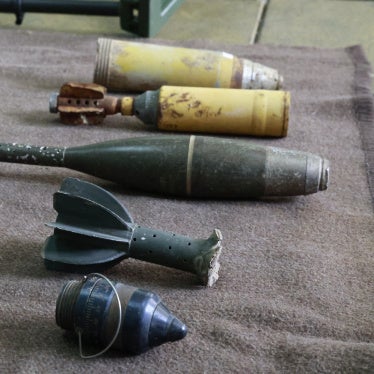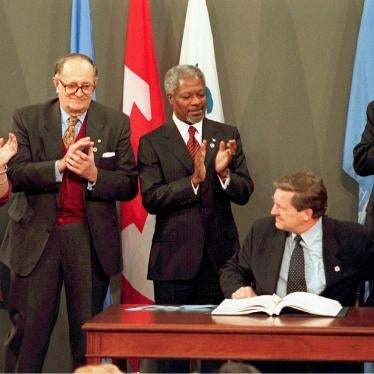Thank you Chairman.
It is undeniable that three years after entry into force of the Convention on Cluster Munitions, overall compliance with the treaty continues to be impressive.
- There have been no allegations of use, production, or transfer by States Parties or signatories;
- State Parties have engaged in extensive and early destruction of stockpiles, and it does not appear that any will have difficulty meeting their deadline;
- Contaminated land is being cleared at an ever increasing rate;
- Nearly all States Parties have acted in accordance with the first time-bound actions of the convention’s victim assistance plan;
- As we have heard in recent days, many States Parties are vigorously promoting universalization of the convention, in accordance with Article 21, although much more can be done;
- Many States Parties have condemned recent use of cluster munitions in Syria, in accordance with Article 21, although every State Party should have done so by now.
In two areas, compliance falls considerably short of impressive.
- First, 16 States Parties have not submitted their initial Article 7 transparency report, and another 17 States Parties are late in submitting their annual update;
- Second, only 22 States Parties have enacted specific legislative measures to implement the convention, in accordance with Article 9, although another 18 States Parties are said to be in the process.
The CMC has expressed deep concerns about some specific national implementation legislation, most notably that enacted by State Party Australia, and that drafted by signatory Canada. The CMC believes that the Australian law’s provisions allowing Australian military personnel to assist with cluster munition attacks by states not party run counter to the convention’s Article 1 prohibition on assistance and Article 9 requirement for penal sanctions for prohibited activities “undertaken by persons or on territory under its jurisdiction or control.”
We see the Canadian draft law as even more problematic and inconsistent with the convention, as it would, for example, allow Canadian forces themselves to use cluster munitions if they are on secondment to the forces of a state not party; the draft law contains other provisions that also appear to run counter to the object and purpose of the convention.
These controversial national laws reflect the disagreement among States Parties about the interpretation of certain provisions, disagreements that have lingered since the convention’s adoption in Dublin. If not addressed, contradictory views on these issues could one day trigger Article 8’s compliance mechanism.
We have elaborated the CMC’s views on these issues many times in the past and will not go into detail now. But we will note the following findings from Cluster Munition Monitor 2013:
- At least 38 States Parties and signatories have agreed that the Convention’s Article 21 provision on interoperability should not be read as allowing states to avoid their specific obligation under Article 1 to prohibit assistance with prohibited acts. The Monitor could identify only four States Parties with a contrary view.
- At least 34 States Parties and signatories have declared that transit and foreign stockpiling are prohibited by the convention. The Monitor could identify only six States Parties with a contrary view.
- Nine States Parties have enacted legislation that explicitly prohibits investment in cluster munitions, and another 25 States Parties and signatories have said that investment in cluster munition production is a form of assistance prohibited by the convention. The Monitor has identified only three other States Parties with a contrary view.
The number of states expressing the overwhelming majority views on these issues continues to grow each year, a sign that these understandings of the treaty continue to gain authority. But we call on all States Parties to make their views known, so that there is no lack of clarity about what the convention bans and what it does not.
Mr. Chairman, Article 8.6 of the convention states that a Meeting of States Parties “may decide to adopt such other general procedures or specific mechanisms for clarification of compliance, including facts, and resolution of instances of non-compliance with the provisions of this Convention as it deems appropriate.”
It is regrettable that States Parties have not yet explored the possibilities presented by this provision. We encourage you to do so, to set aside time during intersessionals and the next Meeting of States Parties, to discuss this provision and options for implementing it, so that if there is an unwanted and unexpected occurrence of non-compliance, States Parties are properly prepared to respond.
Finally, we would like to close by noting that one can also speak of compliance with the new international norm the convention is establishing, rejecting any use or possession of cluster munitions. In this respect, we encourage all States Parties to speak out, or continue to speak out, against ongoing use of cluster munitions by the Syrian armed forces. We also urge States Parties to probe into allegations of use of cluster munitions by the armed forces of Sudan and Myanmar. Details of the allegations are available in the Cluster Munition Monitor.
Thank you.








